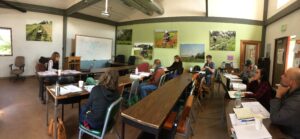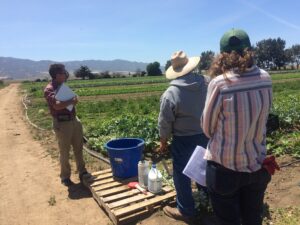Project Overview
Annual Reports
Information Products
Commodities
- Fruits: berries (strawberries)
- Vegetables: beets, broccoli, cabbages, carrots, cauliflower, celery, cucurbits, onions, peppers
- Additional Plants: herbs
Practices
- Crop Production: food product quality/safety
- Education and Training: technical assistance, demonstration, workshop
- Sustainable Communities: local and regional food systems, partnerships
Abstract:
Demand is surging for local, sustainable produce grown on small farms. This presents both opportunities and new challenges for small farmers in an industry that caters to large agribusinesses and which is subject to new food safety regulations. Farmer development programs and food hubs nationwide help small farmers capitalize on growing markets. However, FSMA rules now dictate new on-farm food safety requirements governing access to these markets. Food safety capacity has to be addressed promptly to enable small farmers to secure a strong foothold in mainstream markets.
Those aiming to sell small-farm produce (e.g. food hubs and cooperatives) must invest resources in ensuring that their suppliers are food safety compliant. Group GAP (Good Agricultural Practices) is a new audit program promoted by USDA/AMS as a way to streamline the compliance process and make it more affordable to farmers who are resource-constrained.
The goal of the "Facilitating Food Safety for Small, Sustainable Farms" or "FS3" project was to educate agriculture professionals working with small, sustainable farmers to efficiently comply with newly adopted food safety standards in reaching growing markets for sustainably grown produce. Project activities included: direct consultation with 5 organizations on GroupGAP and food safety compliance; a series of five webinars in conjunction with the Wallace Center; a multi-day auditor training; conference presentations; an updated and shareable Quality Management System template; and a case study document. The project reached over 150 participants with direct training (webinars, presentations, audit shadowing and technical assistance) and hundreds more with project materials.


(May 2017: Ag professionals participate in Auditor Shadowing trainings at ALBA)
Project objectives:
1) Objective 1. Research: Document ALBA’s experience with assisting farmers with both GAP And GroupGAP to help guide partners’ strategy in addressing farmer food safety.
2) Objective 2. Education: Strengthen the capacity of professionals working with farmers relating to adoption of Group GAP and produce marketers on adoption of GroupGAP.
3) Objective 3. Outreach: Inform over 100 organizations on GroupGAP through webinars and posting of resources on ALBA website.